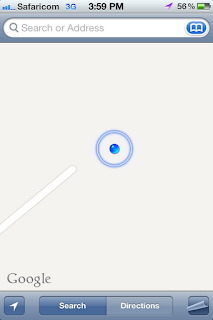The family that we stayed with was perhaps different than you would imagine us being placed with - probably at least upper middle class in terms of economics and quite well educated. While they may not represent the "typical" Kenyan family historically, they may better represent the way Kenya is heading....more on that later. They live just outside of a town about an hour from Kijabe, and they run a sort of hotel/guest house out of their home. He is a school administrator and she is a decorator. They have two teenage daughters who were home from boarding school in the Nairobi area. They are building some small shops (dukas) on the front of their property which abuts the highway, so they were quite busy with that during our time there - we learned that this couple has a history of being quite entrepreneurial.
This is their family room/kitchen area where we took our meals with them. We ate around this coffee table - 9 to 12 people. They usually take their meals here or in front of the television in the evenings.
They cooked many Kenyan dishes for us, which we were delighted to try. In the States, we probably ate more vegetarian dishes than the average American, so we really enjoyed trying many of the bean dishes and mostly vegetable stews. Each of us discovered new foods that we enjoyed. Probably the quintessential Kenyan dish is ugali and sukuma wiki, and we had it several times. Ugali is maize meal and water, heated and stirred until is becomes a dryish mass - jokingly introduced to us as "white cake," but it is more true than not. It is sliced into wedges and served like cake. Sikuma wiki is actually shredded kale - it sometimes has added onions or carrots or spinach, and is cooked in "cooking fat." To say that there is a lot of cooking fat used in Kenya is somewhat of an understatement.
 |
| Ugali and sukuma wiki |
So, I mentioned that they run a type of guest house - mainly for nationals traveling in-country. Our space consisted of two rooms, a bathroom, and a main room - it was their biggest area, as the other areas were one bedroom each.
 |
| The girls shared the twin bed; we had a double bed; Ted slept on a mattress in the "main room." |
 |
| Bathroom - the sink and shower were to the left. Space was roughly 4x5 feet. They even had an instant hot water maker on the shower! |
 |
| The first day we helped to sand new bed frames for the rooms. |
 | ||||
| The first couple of days the hot water/electricity did not work, so we washed hair and bodies in a basin - probably a lot more typical of most Kenyan situations. |
 |
| We taught them how to play (or at least throw) American football. If you refer to "football," that means soccer to most of the world. |
 |
| Diapers for sale |
There were diapers, even Pampers brand, for sale. The fact the many of the packages were opened - presumably because they sell them one at a time - was a metaphor for the way so many Kenyans live. They live on what they earn that day, and they spend only what they need right away. At home, I frequently buy in bulk (think Sam's, Costco, Walmart, etc.), thereby saving through the bulk discount and not having to shop for a while....but Kenyans buy just the gas they need for that trip, just the food they need for that meal, or just the diaper they need for that, well, need.
There is much to share about our homestay experience, but I will share more next time.
Lots of love to you this New Year's,
Sarah
“These things I have spoken to you, so that in Me you may have peace. In the world you have tribulation, but take courage; I have overcome the world.”” John 16:33











































